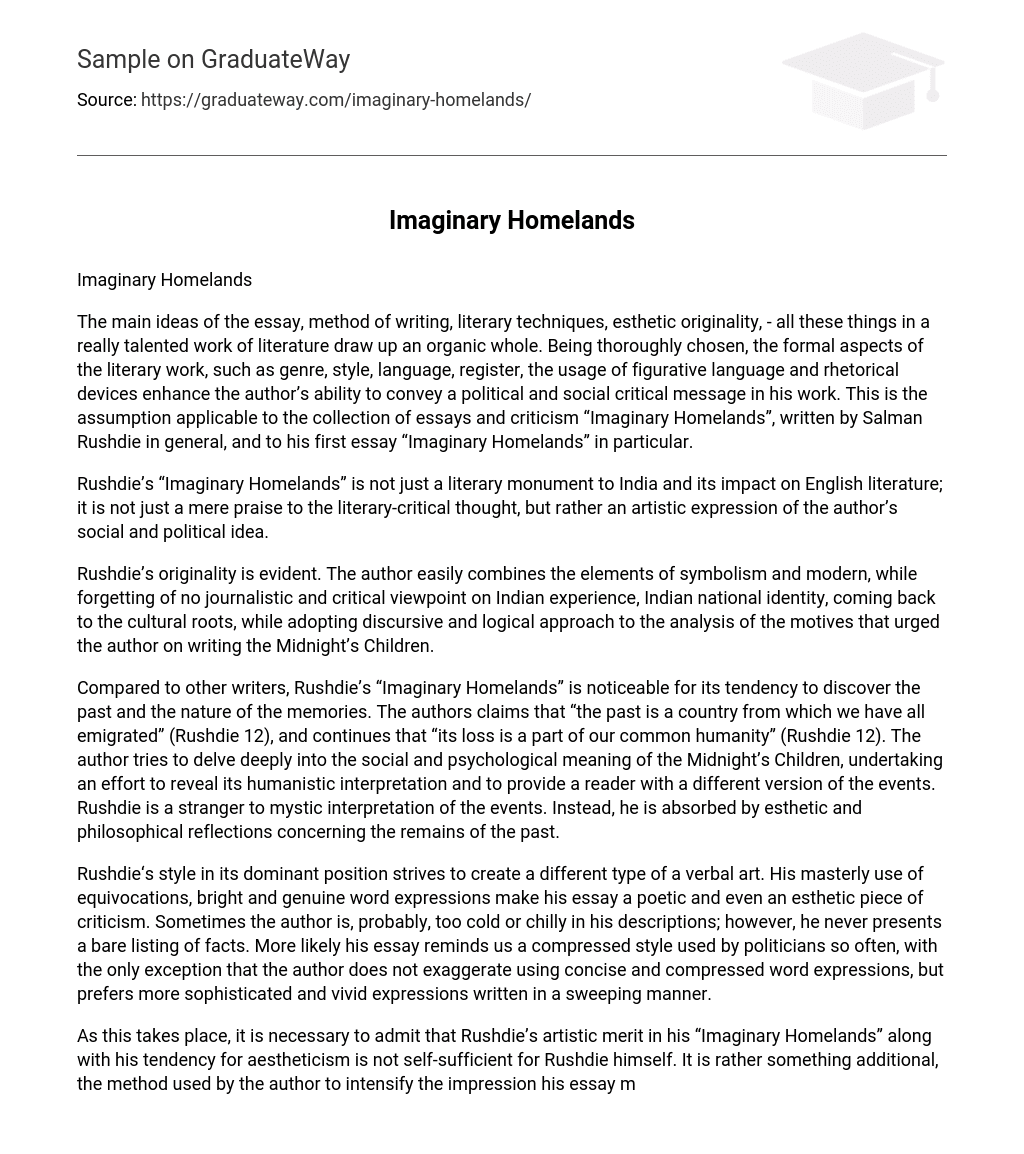The main ideas of the essay, method of writing, literary techniques, esthetic originality, – all these things in a really talented work of literature draw up an organic whole. Being thoroughly chosen, the formal aspects of the literary work, such as genre, style, language, register, the usage of figurative language and rhetorical devices enhance the author’s ability to convey a political and social critical message in his work. This is the assumption applicable to the collection of essays and criticism “Imaginary Homelands”, written by Salman Rushdie in general, and to his first essay “Imaginary Homelands” in particular.
Rushdie’s “Imaginary Homelands” is not just a literary monument to India and its impact on English literature; it is not just a mere praise to the literary-critical thought, but rather an artistic expression of the author’s social and political idea.
Rushdie’s originality is evident. The author easily combines the elements of symbolism and modern, while forgetting of no journalistic and critical viewpoint on Indian experience, Indian national identity, coming back to the cultural roots, while adopting discursive and logical approach to the analysis of the motives that urged the author on writing the Midnight’s Children.
Compared to other writers, Rushdie’s “Imaginary Homelands” is noticeable for its tendency to discover the past and the nature of the memories. The authors claims that “the past is a country from which we have all emigrated” (Rushdie 12), and continues that “its loss is a part of our common humanity” (Rushdie 12). The author tries to delve deeply into the social and psychological meaning of the Midnight’s Children, undertaking an effort to reveal its humanistic interpretation and to provide a reader with a different version of the events. Rushdie is a stranger to mystic interpretation of the events. Instead, he is absorbed by esthetic and philosophical reflections concerning the remains of the past.
Rushdie‘s style in its dominant position strives to create a different type of a verbal art. His masterly use of equivocations, bright and genuine word expressions make his essay a poetic and even an esthetic piece of criticism. Sometimes the author is, probably, too cold or chilly in his descriptions; however, he never presents a bare listing of facts. More likely his essay reminds us a compressed style used by politicians so often, with the only exception that the author does not exaggerate using concise and compressed word expressions, but prefers more sophisticated and vivid expressions written in a sweeping manner.
As this takes place, it is necessary to admit that Rushdie’s artistic merit in his “Imaginary Homelands” along with his tendency for aestheticism is not self-sufficient for Rushdie himself. It is rather something additional, the method used by the author to intensify the impression his essay makes on the reader. His peculiar expressiveness and impressiveness of “Imaginary Homelands” results from the fullness of his emotional and intellectual experiences caused by his world perception along with his desire to speak the language of his readers or, at least, to approximate to it as close as possible. It is also important to clarify that Rushdie’s is alien to the principle ‘expressive words for the sake of expressive words’. On contrary, the author is attracted by the intrinsic processes (quiet often due to his own biographical reminiscence), by the essay’s underlying structure based on its significance, the content and inclusiveness of his artistic words over a wide range of his image-bearing expressions and emotional associations.
Salman Rushdie meditates on “the need for new ways of describing the world” (Rushdie 13) and dwells on whether the novel itself is “one way of denying the official, politicians’ version of truth” (Rushdie 14). Again and over again he places emphasis on the fact that the literature is self-validating, and, therefore, if “literature is in part the business of finding new angles at which to enter reality”, then a long geographical perspective of the people, whose identity is both partial and integral, the people, who straddle two cultures, may provide with “such angles” (Rushdie 15).
The author dwells on Indian theme time and again, focusing attention on being an Indian outside India, problems of definition and national identity, ideas to preserve the culture “without becoming ossified” (Rushdie 17) and conquering English in order to “complete the process of making ourselves free” (Rushdie 17). Rushdie masterly uses all his talent and expressiveness in order to convince the reader and make him believe in need to change “within ourselves and [our] community without seeming to play into the hands of [our] racial enemies” (Rushdie 18).
Rushdie’s “Imaginary Homelands” is not ‘overloaded’ with philosophical erudition; however, the eccentricity, sometimes even paradoxicality of his images, the abundance of different terms and colloquialisms, and somewhat intricate syntax, stately and solemn, instructive, almost priestly tone of Rushdie’s sayings along with pompous declarative nature of his essay, rich in candy-box beauty, make the reader feel lost in Rushdie’s sugary words. Nonetheless, the unquestionable power of Rushdie’s prose is in this evident and close unity with his readers. Compared to other essayists, Rushdie’s power is in his ideas of the novel with their ideological and thematic structure. Imaginary Homelands discusses not only the problems of literature and art, but, at the same time, places high emphasis on political and philosophical themes along with up-to-date events. This unique literary style attaches a shade of modernity and actuality to his essay that captivates the reader from the very beginning to the very end of the Homelands.
Works Cited
Rushdie, Salman. Imaginary Homelands: Essays and Criticism 1981–1991. New York: Penguin, 1991.





